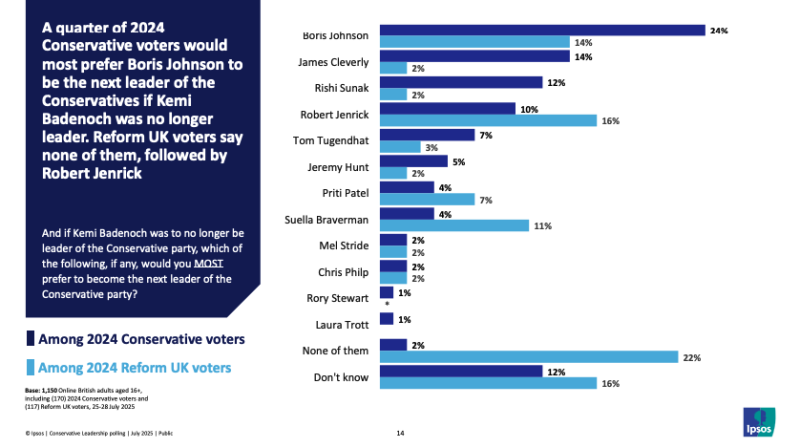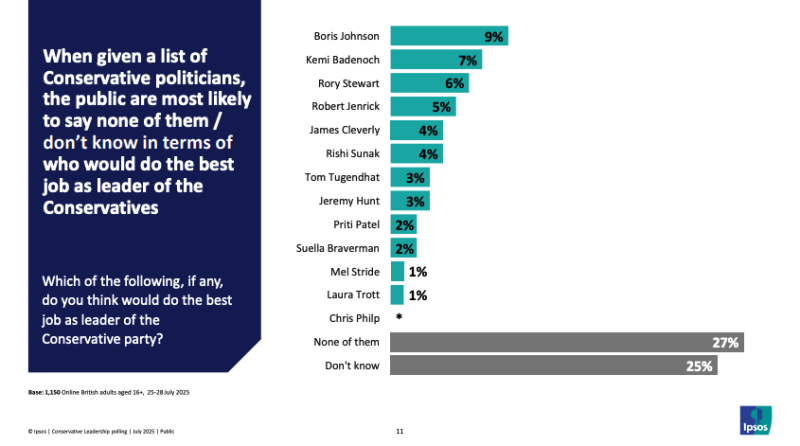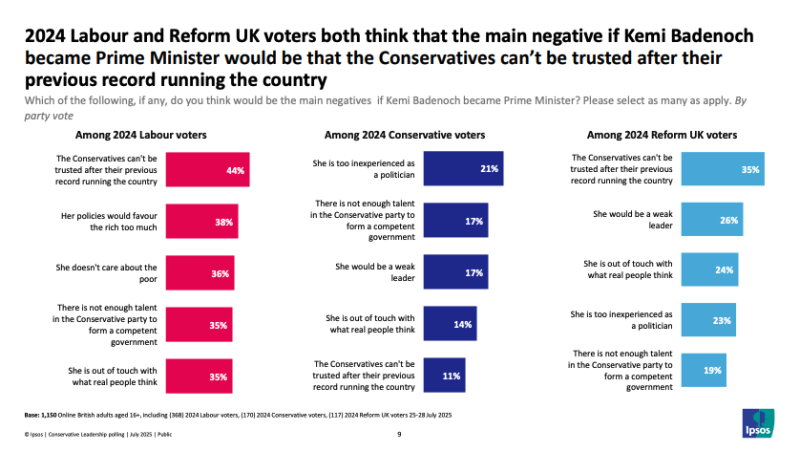Political parties can be creatures of habit. The Conservative Party’s recent habit is of looking backwards when uncertain about the future. That much is clear from its voters in new Ipsos polling exclusively provided to ConHome on the Conservative leadership.
Should Kemi Badenoch falter, Boris Johnson is the clear favourite among those who voted Conservative in 2024 to return and save the party from its post-election despair. Twenty-four per cent of them would have him back in charge, well ahead of James Cleverly (14 per cent) and Rishi Sunak (12 per cent).

It is, on one level, extraordinary. Johnson was ousted in scandal, toppled by colleagues who swore blind that his premiership had become electorally toxic. Two years on, with the Conservatives near reduced to rubble, the same voters see him as the figure who could lead them again.
Despite everything, he remains the one figure many believe can reconnect with voters who have drifted to Labour or Reform.
But among Reform UK voters, the picture is more muddled, with Johnson and Robert Jenrick dividing support – although Jenrick pips him to the post by just two per cent. But the headline is unmistakable: a significant slice of the party’s most recent electorate still sees Boris as the man to lead them again.
The result will only further fuel speculation of Johnson’s comeback – speculation that never really went away. Usually the assessment in Westminster is: “Boris wants to come back. He’ll make a return.”
Then you ask: “How will he come back?” And the answer isn’t forthcoming. It would surely require a by-election, for him to get adopted as the candidate – and why, if the polling has him being favoured over both the current leadership in Badenoch and all her potential parliamentary challengers, would they let him have a seat back at the table.
Looked at more broadly, the same polling delivers a second message. When presented with a list of Tory figures and asked who would be the best Conservative leader, the public’s top option was “none of them” (27 per cent) and “don’t know” (25 per cent); a vote of no-confidence in both the individuals offered up, and likely the party itself.
That is more than half of the respondents in Ipsos’ poll effectively tapped out of Tory leadership. Not itching for a comeback tour; it is an electorate looking at the Tory lineup and shrugging.
They’ve clocked off, and it is worse than the public still being annoyed. It is harder to capture the attention of those who have tuned out than those who are angry – they just aren’t listening to be won back.
Johnson, despite his name recognition, registers only nine per cent overall. But that still has him taking the top spot ahead of Badenoch in the general public’s eyes. Among 2024 Conservative voters, Badenoch and Johnson are effectively split (16 and 17 per cent).
But then again Rory Stewart trails her by a single percentage. If this is what the public thinks the party has in store: a former leader, a current one and … Rory Stewart – it doesn’t necessarily bode well.

It all speaks to a broader issue, and it is that Badenoch’s premiership has not landed with the public. Badenoch was meant to be the reset button – young, articulate, and not so tainted by the failures of her predecessors.
Instead, six in ten cannot name a single positive reason why she should be Prime Minister. From a list of potential positive statements if she were to become PM, only 13 per cent selected that she would get immigration under control, and just 12 per cent that she would grow the economy. Among Conservatives themselves, faith is founded less on specific policies than on the belief – comforting but questionable – that the party simply has a better record of running the country than Labour (34 per cent).
It may be tempting to be taken by this: Johnson doing well in the polls and people looking at the Tories record as a positive – but it would be wise not to fall for it too quickly.
The most common concern about a potential Badenoch premiership is not about her personal qualities but the party’s recent record: 30 per cent say the Conservatives cannot be trusted after their previous time in office. That figure is even higher among Labour voters (44 per cent) and substantial among Reform supporters (35 per cent).

Among Conservative voters in the last election, however, 21 per cent think Badenoch is too inexperienced. Against Keir Starmer, when asked who would make a better Prime Minister, Badenoch trails by ten percentage points, and Nigel Farage – despite his own high negatives – is more likely than the Tory leader to be preferred as a potential PM.
As Keiran Pedley of Ipsos says: “This latest polling shows the scale of the challenge for the Conservative opposition. Not only does Kemi Badenoch trail Keir Starmer in who the public think would be the better Prime Minister, but the party’s recent record in government is still the biggest single barrier for voters… While Nigel Farage also faces high negative ratings, he currently holds a narrow advantage over Kemi Badenoch in the eyes of the public, adding another complex dynamic to the opposition landscape.”
He drly notes: “Even among their own voters, there is no consensus on the path forward.” That’s Westminster code for nobody knows what to do.
It sees the Tory Party left adrift; none of its potential leaders inspire much confidence. All were involved in the last series of governments one way or another, causing this loss of trust, yet they are still the individuals people are looking to for leadership.
It leaves the Johnson dilemma: Yes, among core Tory voters Johnson remains the top choice, but among the broader electorate he commands little more support than anyone else.
The hard truth that the Conservative Party must face is that their crisis is not just about Badenoch or Johnson, Sunak or Cleverly. It is a crisis of trust and purpose. Until the party can convince voters that it has learned from its years in power and offers something new, talk of leadership changes will be little more than displacement activity. Johnson may still cast the longest shadow – but a shadow cannot lead a party back into government.





![ICE Arrests Illegal Alien Influencer During Her Livestream in Los Angeles: ‘You Bet We Did’ [WATCH]](https://www.right2024.com/wp-content/uploads/2025/08/ICE-Arrests-Illegal-Alien-Influencer-During-Her-Livestream-in-Los-350x250.jpg)
![Gavin Newsom Threatens to 'Punch These Sons of B*thces in the Mouth' [WATCH]](https://www.right2024.com/wp-content/uploads/2025/08/Gavin-Newsom-Threatens-to-Punch-These-Sons-of-Bthces-in-350x250.jpg)








